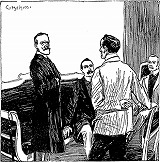“That is a State secret of the utmost importance, and I fear that I cannot tell you, nor do I see that it is necessary. If by the aid of the powers which you are said to possess you can find such an envelope as I describe with its enclosure, you will have deserved well of your country, and earned any reward which it lies in our power to bestow.”
Sherlock Holmes rose with a smile.
“You are two of the most busy men in the country,” said he, “and in my own small way I have also a good many calls upon me. I regret exceedingly that I cannot help you in this matter, and any continuation of this interview would be a waste of time.”

The Premier sprang to his feet with that quick, fierce gleam of his deep-set eyes before which a Cabinet has cowered. “I am not accustomed, sir, ” he began, but mastered his anger and resumed his seat. For a minute or more we all sat in silence. Then the old statesman shrugged his shoulders.
“We must accept your terms, Mr. Holmes. No doubt you are right, and it is unreasonable for us to expect you to act unless we give you our entire confidence.”
“I agree with you,” said the younger statesman.
“Then I will tell you, relying entirely upon your honour and that of your colleague, Dr. Watson. I may appeal to your patriotism also, for I could not imagine a greater misfortune for the country than that this affair should come out.”
“You may safely trust us.”
“The letter, then, is from a certain foreign potentate who has been ruffled by some recent Colonial developments of this country. It has been written hurriedly and upon his own responsibility entirely. Inquiries have shown that his Ministers know nothing of the matter. At the same time it is couched in so unfortunate a manner, and certain phrases in it are of so provocative a character, that its publication would undoubtedly lead to a most dangerous state of feeling in this country. There would be such a ferment, sir, that I do not hesitate to say that within a week of the publication of that letter this country would be involved in a great war.”
Holmes wrote a name upon a slip of paper and handed it to the Premier.
“Exactly. It was he. And it is this letter - this letter which may well mean the expenditure of a thousand millions and the lives of a hundred thousand men - which has become lost in this unaccountable fashion.”
“Have you informed the sender?”
“Yes, sir, a cipher telegram has been despatched.”
“Perhaps he desires the publication of the letter.”
“No, sir, we have strong reason to believe that he already understands that he has acted in an indiscreet and hot-headed manner. It would be a greater blow to him and to his country than to us if this letter were to come out.”
“If this is so, whose interest is it that the letter should come out? Why should anyone desire to steal it or to publish it?”
“There, Mr. Holmes, you take me into regions of high international politics. But if you consider the European situation you will have no difficulty in perceiving the motive. The whole of Europe is an armed camp. There is a double league which makes a fair balance of military power. Great Britain holds the scales. If Britain were driven into war with one confederacy, it would assure the supremacy of the other confederacy, whether they joined in the war or not. Do you follow?”
“Very clearly. It is then the interest of the enemies of this potentate to secure and publish this letter, so as to make a breach between his country and ours?”
“Yes, sir.”
“And to whom would this document be sent if it fell into the hands of an enemy?”
“To any of the great Chancelleries of Europe. It is probably speeding on its way thither at the present instant as fast as steam can take it.”